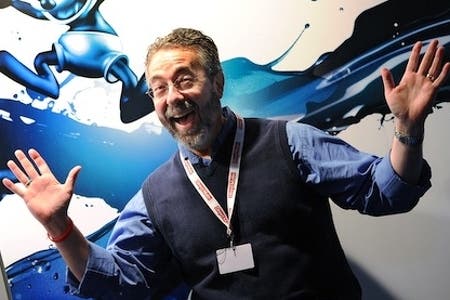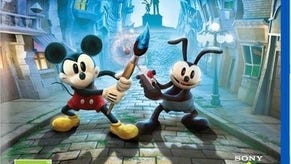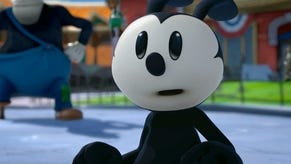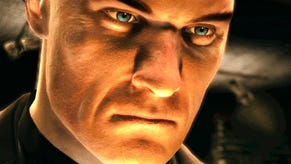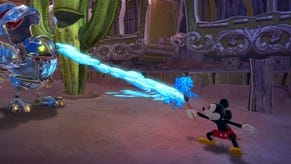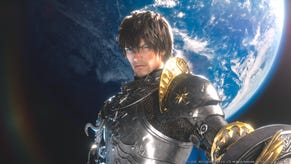Animated Man: Warren Spector Profile
The man behind the mouse talks about his eclectic interests, making games for everyone, and his dream game.
It's fitting that Warren Spector makes games about Mickey Mouse, because he's one of the most animated individuals I've had the pleasure of interviewing. Midway through our chat he gets up and pantomimes a move from a cancelled game collaboration with Hard Boiled director John Woo.
Actually, he's reenacting the manoeuvre Woo acted out for him to show off his vision of their lead character, modern day ninja Katsato, swooping down from above in a special trench coat that would allow him to glide like Batman.
"He leaps from the roof of a building, then he does this," Spector says as he transitions from his arms outstretched to a kneeling position. "He flicks his arms back and lands. He comes down on one knee... He can instantly fire off shurikens as he lands!" Spector starts flicking out a series of imaginary ninja stars across our tiny meeting room.
Violent Hong Kong action flicks about guys with twin pistols and sunglasses may seem leagues away from Mickey and Goofy yucking it up in Toon Town, but maybe they're not so different after all. They're both predicated on stylish, larger than life choreography, graceful movements, and inventive set-pieces.
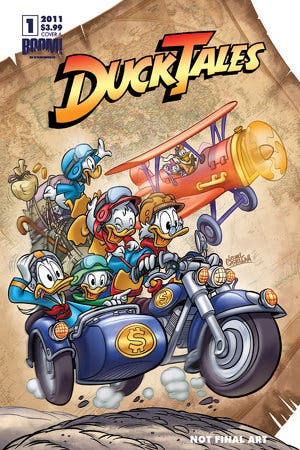
As it turns out Spector, whose resume includes dark, gritty games like Deus Ex and Thief as well as more family-friendly fare like Epic Mickey and its impending sequel, doesn't see the drastic shift in his work that fans do.
"People see the transition from the sort of more realistic and more obviously serious stuff and the stuff I'm doing now, and I don't even really see that much from sort of a core philosophical standpoint."
He points to two of his most well know works, Deus Ex and Epic Mickey. "They're all about players expressing themselves through play," he states, "about telling their own story and creating their own unique play experience. They're about being offered choices that are not right and wrong. They're not good and evil. They are not moral in nature, but are about questioning. Both games ask the player to consider questions and come up with their own answers. The tone and the content are different, but Deus Ex and Disney Epic Mickey at their heart are the same thing."
So why the switch in tone and content? The answer is simple; Spector has been a Disney fanboy his whole life. "It's a return to roots," he tells me. "Not a change of direction."
"The tone and the content are different, but Deus Ex and Disney Epic Mickey at their heart are the same thing."
"I got a Master of Arts writing about cartoon characters and how they evolve over time," Spector explains. "The first game I worked on in 1983 was called Toon: The Cartoon Role-Playing Game. It was a tabletop game... The third of fourth role-playing game I worked on was called the Bullwinkle and Rocky Party Role-playing Game."
"When I told my mother that I had taken a job at Disney the day I parted my studio, her response was 'it's about time."'
That explains why he's making cartoon games now, but what about why he made dark sci-fi games before? I expect some kind of sulen, personal revelation like when George Lucas admitted that the reason Indiana Jones and the Temple of Doom was so grim was because he was going through a divorce at the time. Spector's answer then may be disappointingly rational; he simply likes cartoons and cyberpunk fiction. Shocking, I know. "It's almost like you can't be interested in two different kinds of things," Spector laughs, showing signs of irritation at accusations that he's sold out or gone soft.
Spector partially attributes his interest in cyberpunk with it the zeitgeist of the late 80s. "There was a period in the evolution of games when we were all teens to 20-something guys - there were a few women involved, but it was mostly guys - and we were into cyberpunk science-fiction. My first game master was Bruce Sterling, one of the founders of cyberpunk science-fiction."
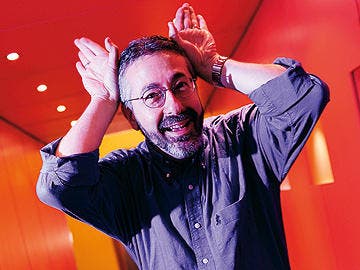
Beyond his interest in the genre, there were commercial reasons for making these sorts of games, too. "What makes you think I wasn't pitching cartoon ideas all those years too?" He says. "I could show you Death and Destruction: The Mad Scientist Simulator proposal that I pitched to Origin in 1990. The cartoony game of a mad scientist trying to prevent heroes from exploring things man was not meant to know. I could show you all sorts of cartoon proposals that no one would fund it because no one in the PC business - or even in the videogames business - was interested in cartoon games. You go with what people are willing to publish."
I tell him this surprises me because when I started playing games in the late 80s many of them were aimed towards kids, citing Monkey Island as an example. "Not me though," says Spector. I shoot him an incredulous glance. "I'm serious... The average age of players of my games has always been older. It started out about 24-25, and by the time Deus Ex came the average age of people playing my games in particular was early 30s. I've always made games for adults."
"The average age of players of my games has always been older. It started out about 24-25, and by the time Deus Ex came the average age of people playing my games in particular was early 30s. I've always made games for adults."
This is still as true for Spector's games as always, despite the tonal shift. "One of the things I'm most proud of that surprises a lot of people is that more than half of the audience for Disney Epic Mickey was over the age of 18. That pleased me and surprised me a little bit because we didn't make a game for kids. People ask me 'when are you going to make another adult game?' I say 'I already did.'"
Though that's a gross oversimplification. The truth is Spector doesn't want to make games "for adults," or "for kids" or "for gamers" anymore. He wants to make games for everyone. He came to this realization after a meeting with Toy Story and Finding Nemo creator John Lasseter. "He said, 'At Pixar we don't target an audience. We don't look at demographics. We make entertainment for everyone.' That just floored me. I just said, 'Why can't a game do that? Why do games have to be aimed at teenage boys, or tween girls or whatever? Why can't we try to make a game that appeals to everybody?' And that's what I want to do from now."
These days Spector is tired of deadly science fiction and action games. "I have literally negative interest in 'you're the last space marine that's standing between earth and an alien invasion.' We just don't need another game like that. I'm really just not at all interested personally in making a game about women in fur bikinis and guys in chain mail armour. I've done that."
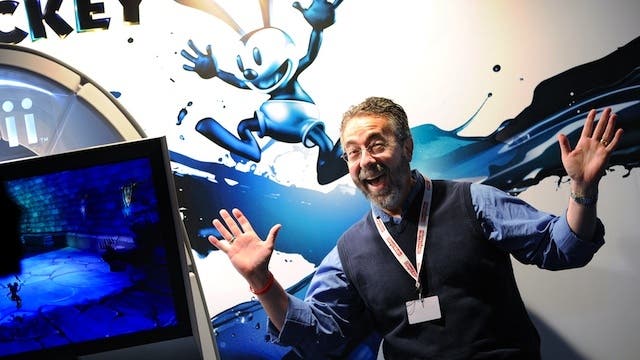
"And on a personal level -- you know, slow motion blood spurts? Is that mature? 'Oh look, you can have simulated sex with a hooker.' Is that adult? Is that mature? I mean, grow up. Disney Epic Mickey 2 is more mature than most of the M-rated games that you see at E3."
This isn't to suggest that Spector may not go back to the stark brutality of his earlier titles. "I might go back. I have a science fiction game that I really want to make. I have a fantasy world that I've wanted to set a game in for over 20 years. I've got a 12-issue comic series already planned out," he says referring to a project he created with his wife, Caroline, decades ago.
Aside from these decades old ideas still rattling around in Spector's overflowing brain, he's got plenty more properties he'd love to explore at the house of the mouse.
"I've really fallen in love with the Gremlins. I'd love to do a Gremlins kind of game," he says, and that's not the only concept that excites him. "I've got some ideas about what I would do with Goofy that are kind of goofy," he says, before getting excited about another possibility. "Anybody who says they don't want to do anything with Fantasia isn't thinking hard enough."
But there's one series above all that remains Spector's Moby Dick; Duck Tales. Despite Spector's clout in the industry, his handlers at Disney won't let him make his dream game. Not yet, anyway. "A week does not go by where I don't whine at someone inside Disney. I've gone all the way up to the CEO actually and just said, 'Let me do a Duck game. Let me do a Duck game! I just figure if I keep doing that long enough they'll let me do it just to shut me up."
"Scrooge has always been my favourite Disney character. The idea of Scrooge McDuck, the richest man in the world, looking back on a life where he really was sort of Indiana Jones before Indiana Jones was even a gleam in the eyes of Spielberg and Lucas. They've acknowledged the debt that they owe to Carl Barks, the guy who really kinda made Scrooge what he is today. And it's true. Here's this amazing character who goes to everywhere from outer space to under the sea to the tombs of Egypt to the heart of the Nile and the Amazon jungle and deals with lost lands of dinosaurs still in existence... Scrooge has lead the most adventurous life of any character in literature."
"Disney Epic Mickey 2 is more mature than most of the M-rated games that you see at E3."
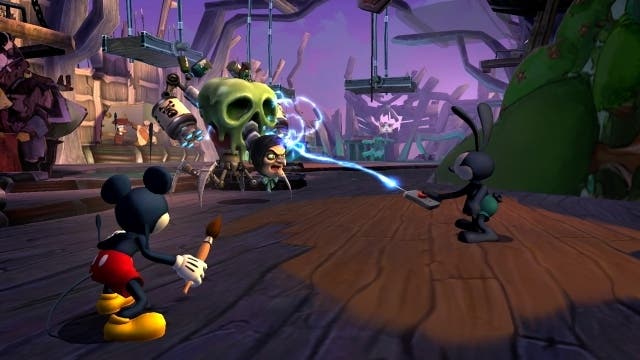
It's about more than just Scrooge, though. Spector has an affinity towards his nephew Donald as well. "Donald is an everyman who we can all relate to. Donald is the guy with anger management issues. He's always just trying to make good and being frustrated and falling short."
"I love that cast of characters. The love they have for each other, the frustrations that they have for each other, and the adventures they share."
While Spector hasn't been given the green light for a Duck Tales game yet, he was allowed the privilege in dabbling with the ducks in comic form. "I just wrote four issues of Duck Tales last year. And that was one of the hardest but coolest things I ever got to do."
Despite not yet working on his dream game, Spector is elated to have the creative freedom to alter the canon of his favourite Disney characters. He even got to pick the voice for Oswald the Lucky Rabbit in the previously silent character's first speaking role in a Disney product.
"He's kind of naive and innocent," Spector explains when asked what characteristics he was looking for in the voice for Oswald. "He's probably a little too trusting. He's a little Donald-like in that he's quick to anger. But his heart is full. He's a really lovable little guy. He's mischievous. But it's mostly that sort of naive innocence that attracts me."
It's that same naive innocence that I find so appealing about Spector too. In an E3 full of rehearsed corporate presentations, Spector surprises me by saying he's willing to email me the casting sheet detailing Oswald's characteristics before a PR rep starts shaking her head. Oh well.
As for now Spector says "I'm really happy right now making games about a mouse and a rabbit." Maybe I'm naive too, but I absolutely believe him.
